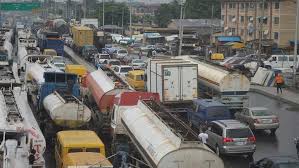Truck owners operating at Nigerian seaports have thrown their full support behind the Nigerian Ports Authority’s (NPA) electronic call-up system known as Eto, saying the platform has brought order to previously chaotic port access roads in Apapa and Tin Can Island.
In a statement released after a peaceful rally in Lagos, the Secretary-General of the Association of Maritime Truck Owners (AMATO), Mr. Mohamed Sani-Bala, described the system as a landmark achievement that has transformed Nigeria’s maritime logistics. He said the platform, which was launched by the NPA in partnership with the Lagos State Government and a private tech provider, has brought automation, transparency, and efficiency to port operations.
Mr. Sani-Bala said the Eto app has ended decades of suffering for truck drivers who used to spend days queuing under inhumane conditions just to access the port. He explained that, in the past, drivers were forced to pay illegal fees ranging from N250,000 to N300,000 to access the port without any guarantee of entry. Now, with the new system, drivers can book their truck movement slots online from any location at a flat rate of N21,500.
He said, “On behalf of the trucking community, we use this peaceful rally to express our deep gratitude to the NPA for introducing the Eto Call-Up System and also appreciate the Lagos State Government for helping to enforce the rules that make it work.” He called the system a game-changer and said it has brought an end to the suffering of truckers and improved the overall environment along the port corridor.
According to him, “The Eto platform has completely removed the need for physical queueing and reduced the influence of road cabals. Truckers now have access to a transparent and predictable system that makes their work easier and safer. There is no more need to sleep on the road or worry about dying behind the wheel from stress or exhaustion.”
Sani-Bala also noted that the changes have had a positive effect on communities around the port. He said Apapa, which used to be abandoned due to gridlock, is now coming back to life. “Property values are rising, businesses are running on time, and people are regaining their quality of life,” he said.
He, however, criticised what he called a “campaign of calumny” being sponsored by individuals who profited from the old manual system. He accused these detractors of trying to take the system backward for personal gain. “Those who used to charge truckers N250,000 are now accusing a system that charges only N21,500 of fraud. That is shameful. If they cared about truckers, they would have created a fair system when they were in charge,” he said.
Sani-Bala urged members of the trucking community to stay united and resist efforts to undermine the Eto platform. He said the manual call-up system is now dead and buried, and Nigerians must embrace a tech-driven future for port operations.
He also commended Truck Transit Parks Limited (TTP), the private company behind the Eto platform, for helping restore sanity to the port logistics space. “We say kudos to the NPA, Lagos State Government, and TTP for their roles in transforming our roads and port operations,” he said.
Also speaking, Mr. Afeez Alabi, the Public Relations Officer of the Maritime Truck Drivers Association, warned that attempts to return to the old ways could cripple port operations and disrupt the progress made so far. He said the digital system has improved order and reduced congestion.
However, Alabi admitted there are still challenges, such as the rise of a black market for call-up slots. He revealed that despite the official rate being N21,500, some people now resell the slots for as much as N130,000. He said this growing corruption must be tackled quickly to preserve the gains of the system.
Alabi called for stronger monitoring and enforcement to close loopholes and urged the authorities to stay firm in defending the reforms. “The digital system is not perfect, but it has exposed irregularities and brought needed order to truck movements. We will not accept any move that threatens to return us to the past,” he said.
The Eto call-up system, which was introduced in 2021, aims to tackle gridlock on the roads leading to Nigeria’s busiest ports by regulating truck entry based on scheduled appointments. Before its launch, port access roads were plagued by severe traffic, largely caused by unregulated truck movements, corruption, and poor infrastructure.
